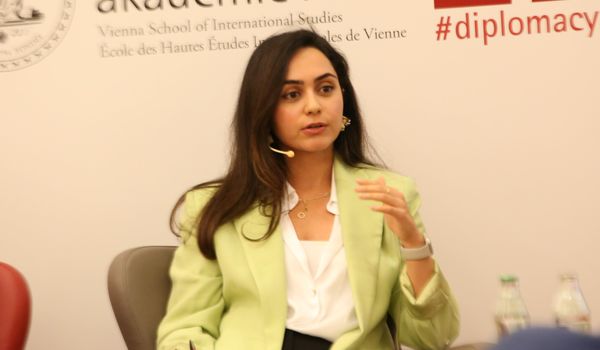On October 15th, VIDC hosted a panel discussion titled „Feminist Foreign Policy in Reality Check: Perspectives from Afghanistan, Iran and the Middle East“. Panelists included Barbara Mittelhammer, a German political analyst, Horia Mosadiq, an Afghan human rights defender, and Diba Mirzaei, a researcher from the Iranian diaspora. They shared insights into how the claims of a feminist foreign policy hold up in practice.
Global dynamics necessitate new visions
Micheal Fanizadeh opened the event by emphasizing that the absence of feminist foreign policy is evident not only in the underrepresentation of women in diplomacy, but in the global rise of militarism, and the diminishing focus on human security within in EU security policies. As Horia Mosadiq stressed, placing women in positions of power alon does not create meaningful change if systematic inequality remains. In a world plagued by conflict, it’s essential to remember that inequality fuels discord, and feminist foreign policy therefore aims to address unequal access to power.
Barbara Mittelhammer explained that feminist foreign policy approaches are not ahistorical; they evolved over the 20th century. With countries like Sweden and Germany adopting feminist foreign policy frameworks, the concept has gained global prominence. However, the rise of authoritarianism and illiberal governments, which constricts human rights and democracy, has sparked a backlash against feminist policies – precisely at a time when policies protecting these values are more crucial than ever.
“If we fail to invest in diplomacy, human rights, civil society support, we will have to pay much more later then.” – Barbara Mittelhammer, political analyst
The global surge in authoritarianism, a well-funded global anti-feminist movement, and the global shift to the right with its populist narratives (especially on migration), demand the development of counter-narratives. We need build positive visions for a peaceful and secure Europe that promotes peace and stability globally.
Double standards and hypocrisy
For countries that claim a feminist foreign policy to gain credibility, they must also address feminist issues domestically, for instance, in their migration and climate policies. Simply expecting other nations to uphold feminist ideals is insufficient. The EU’s double standards in this regard risk alienating potential partners, both at the state and civil society level. Honest dialogue is needed to mend broken relationships and demonstrate that human rights are universally valued. This is particularly pressing as Western hypocrisy is increasingly scrutinized, especially given Europe’s perceived inaction regarding the war in Gaza.
Feminist foreign policy must be reflected in the actions of Western governments, not just in lip service to women’s rights. Currently, foreign policy still prioritizes national interests, as shown in the examples cited by Mosadiq, where self-interest has led the international community to support the Taliban’s anti-women demands.
How to deal with anti-women regimes?
The top priority should be to avoid causing harm, whether by exposing local human rights defenders to state persecution in Iran or by acquiescing to the Taliban’s demands, thereby reinforcing the Taliban’s authority.
The international community’s willingness to accept “cultural” or “religious” justifications from oppressive regimes is deeply troubling.
“You’re telling me that what the Taliban are doing is part of the religion and part of the culture and you shouldn’t touch it? I can’t recognize this religion or this culture that Taliban are imposing on the country!” Horia Mosadiq, Afghan activist
Narratives around culture and religion should be critically examined. To base policy on accurate, on-the-ground information, EU states must work more closely with local civil society organizations and the diaspora, whose expertise is often underutilized by EU policymakers. Local organizations need better access to sustainable funding, capacity building, and networking opportunities, which could be facilitated by offering fellowships for individuals from affected countries like Iran.
Furthermore, sanctions should not inadvertently harm local organizations; in cases where sanctions are deemed unavoidable, they must be targeted. For example, sanctions on airlines that restrict citizens’ ability to leave the country are counterproductive. Supporting local civil society and diaspora groups with tangible actions, not just rhetoric, helps uphold human rights within a country even when regimes fail to do so. Although oppressive regimes may never embrace feminist ideals, progress can still be made at the societal level that endures beyond any regime.
“The question is: How can we support society so that when the regime is gone – and it will be gone at some point – that they will be prepared for a free Iran and a democratic Iran.” – Diba Mirzaei, researcher from the Iranian diaspora
Examples include the large-scale protests in Iran following the killing of Mahsa Amini in 2022 and the ongoing efforts of Afghan women to recognize gender apartheid as a crime against humanity under international law. Social change is possible, but as of now, the EU’s efforts to foster it are insufficient.
The question of whether breaking all contact to a regime is ever a good policy option was critically discussed by the panel, as the risk of thereby isolating the local population by doing so, should not be underestimated. It was agreed that feminist foreign policy requires setting clear boundaries with anti-women regimes like the Taliban. Fundamental human rights, such as the right to education for girls, must remain non-negotiable principles in international relations - even from the Taliban.
Focus on human security rather than national security
While diplomatic de-escalation – such as efforts to revive the nuclear deal with Iran – is a welcome shift from militarism, Western security policies towards both Afghanistan and Iran continue to prioritize national security (of Western states) over human security, contrary to feminist foreign policy principles. Given the continuum of violence women face, including domestic violence, political oppression, and economic hardship under corrupt regimes, feminist foreign policy must take a different view on security. Security must center on human security, encompassing the safety of women and marginalized groups as a core priority.





